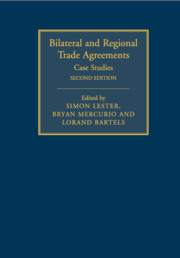Book contents
- Frontmatter
- Contents
- Contributors
- Table of cases
- Table of treaties and international agreements
- List of abbreviations
- 1 The United States–Korea Free Trade Agreement
- 2 EU–Korea Free Trade Agreement
- 3 United States–Colombia Trade Promotion Agreement
- 4 China–New Zealand Free Trade Agreement
- 5 China–Taiwan Free Trade Agreement
- 6 The ASEAN–Australia–New Zealand FTA (AANZFTA)
- 7 The CARIFORUM–EU Economic Partnership Agreement
- Index
2 - EU–Korea Free Trade Agreement
Published online by Cambridge University Press: 05 December 2015
- Frontmatter
- Contents
- Contributors
- Table of cases
- Table of treaties and international agreements
- List of abbreviations
- 1 The United States–Korea Free Trade Agreement
- 2 EU–Korea Free Trade Agreement
- 3 United States–Colombia Trade Promotion Agreement
- 4 China–New Zealand Free Trade Agreement
- 5 China–Taiwan Free Trade Agreement
- 6 The ASEAN–Australia–New Zealand FTA (AANZFTA)
- 7 The CARIFORUM–EU Economic Partnership Agreement
- Index
Summary
Introduction
On 6 October 2010, the European Union (“EU”) and its Member States signed a free trade agreement with the Republic of Korea (“Korea”). The treaty (the “EU–Korea FTA”, or “the Agreement”), which has been provisionally applied since 1 July 2011 is the first of a new generation of free trade agreements (“FTAs”) concluded by the EU. It is the most important trade agreement concluded by the European Union since the conclusion of the Marrakesh Agreement establishing the World Trade Organization (WTO) in 1994. This chapter seeks to place the EU–Korea FTA in its policy and legal framework in the European Union, provide a general overview of the content of the Agreement and analyse its impact on trade between the EU and Korea.
The decision to launch negotiations for an FTA with Korea followed the adoption of a new trade strategy by the EU. In October 2006, the European Commission adopted a Communication setting out its future trade policy entitled “Global Europe: competing in the world; a contribution to the EU's Growth and Jobs Strategy”. This Communication proposed a far-reaching strategy aimed at maintaining the EU's competitiveness worldwide.
While stressing the EU's willingness to carry the Doha negotiations forward and its commitment to the WTO, the Global Europe Communication is significant in that it argues in favour of a bilateral approach to international trade through the negotiation of free trade agreements with key trading partners. In this new trade strategy, the European Commission acknowledges that FTAs can constitute a risk to the multilateral trading system, but also considers that they can be beneficial if they “[are] comprehensive in scope, provide for liberalisation of substantially all trade and go beyond WTO disciplines”. In addition, given the difficulties encountered in the Doha negotiations, FTAs were considered the most viable option to further liberalise trade in sectors that are key to the EU economy and to its global competitiveness, such as services, investment and public procurement.
The Global Europe Strategy also identified strategic partners with whom “new generation FTAs” should be concluded by resorting to two main criteria: market potential (in terms of economic size and growth) and the level of protection against EU export interests (both tariff and non-tariff barriers). Several economic partners were thus singled out as priorities for FTA negotiations: ASEAN countries, India, Mercosur and Korea.
- Type
- Chapter
- Information
- Bilateral and Regional Trade AgreementsCase Studies, pp. 39 - 59Publisher: Cambridge University PressPrint publication year: 2016
- 1
- Cited by



